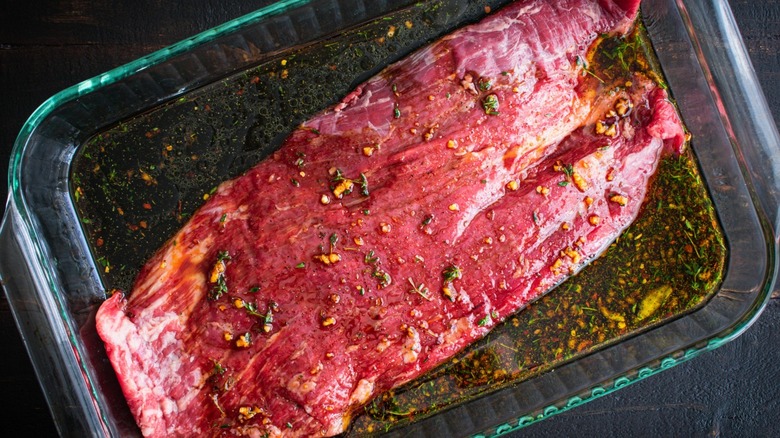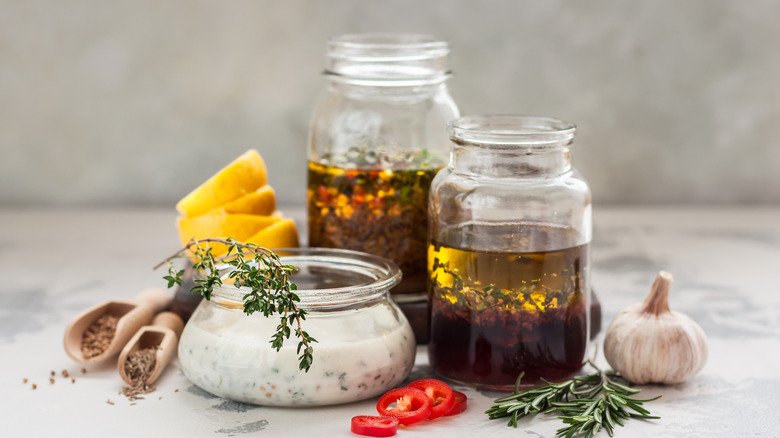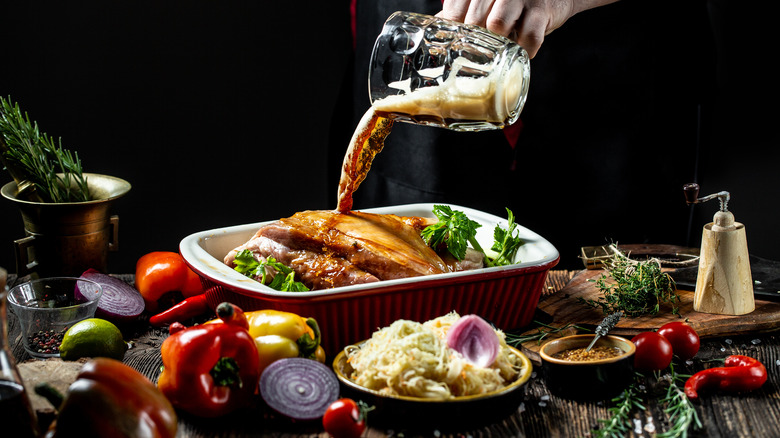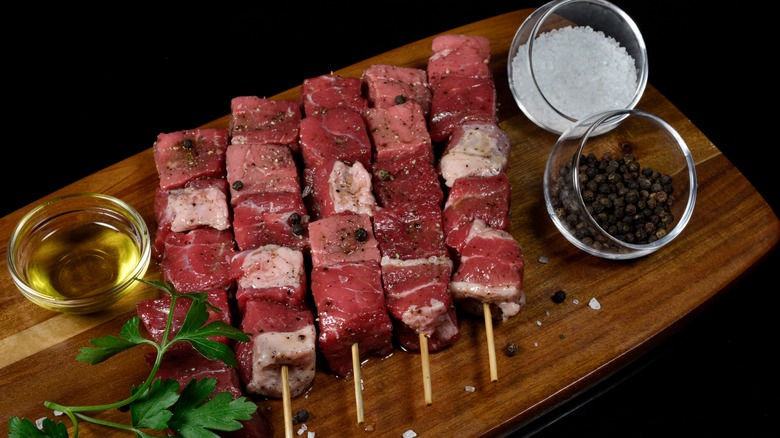The Best Way To Marinate Meat, According To Science
If you're a carnivore, chances are you've had to marinate meat at some point in your cooking journey. According to culinary scientist Jessica Gavin, a perfect marinade is like a flavor bath for your beef, chicken, fish, and pork that finds its way past the meat's surface. It results in a delicious, tender, juicy experience for your mouth.
But Gavin also notes that marinades aren't without their perils. A good marinade boasts a yin and yang of acids and spices and sweet and salty, accompanied by just the right amount of soaking time to achieve this gastronomic bliss. One misstep, and you could end up with a dry, chewy bite of meat that has you reconsidering becoming a vegetarian.
There's clearly more to a marinade than throwing whatever ingredients and leftover condiments you might have lurking in the fridge into a bowl so they don't go to waste. (No judgment. We all do it.) According to Bon Appétit, there's a formula to creating a good marinade. It requires an oil, an acid, something sweet, something savory, and some spices and aromatics. But when it comes to the acid, it can be confusing. Yogurt, vinegar, or citrus juices not only create different flavors, but they also can change the weight and texture of the meat.
Lactic acid keeps meat plump
Serious Eats took readers to its cooking lab to help home cooks understand the role acid plays in marinades. The brand shared its findings about the best way to marinate meat, specifically chicken and lamb, based on the experiment.
The cooking site marinated chicken and lamb in lactic acid, citric acid, and acetic acid. Of the three, the lactic acid — think yogurt- and dairy-based products — was the mildest when it came to its effects on the meat's texture. Lactic acid also didn't reduce the weight of the meat as much — lower shrinkage — during either the marinating or cooking process.
So, why does it work so well? According to Epicurious, yogurt is a great marinade for chicken because the active bacteria goes to town on the protein, while the lactic acid does its magic effectively, but much slower than other acids, leaving behind a tender piece of meat that's ready to cook. Epicurious also notes that the "gentle" interaction between the lactic acid and the protein minimizes some of the marinade challenges you encounter with vinegar- and citrus-based acids. So, the next time you're making lamb or chicken, you may want to put this science to the test and try a lactic acid-based marinade.
How a marinade works
Despite what many of us might think, marinades do not go very deep into the skin and flesh of the meat. According to AmazingRibs.com, a marinade is a "surface" treatment. The only exception to this would be if you soaked your meat in salt, which is easily sucked up and dissolved by all the moisture in the meat. The site explains that it is important to remember that meat is made up of about 75% water.
While sodium is readily absorbed by the water in your various meat cuts, the same cannot be said about your vinegar varieties, lactic acids, oils, sugars, and aromatics. However, acid can still have a big impact. Because acid deteriorates protein, it can result in a mushy surface or even alter the protein so much that it can't trap moisture, meaning dry meat. In fact, Cook's Illustrated recommends very limited use of acid. However, chef-instructor Christopher Arturo of the Institute of Culinary Education told HuffPost that "fat mutes flavors like salt and acid," so fatty meat would call for more acid in the marinade, not less.
And if a marinade relies mainly on salt, it is most likely a brine. But even salt needs time to work its magic. AmazingRibs.com's resident scientist and advisor, Prof. Greg Blonder shared that you would need to soak your meat in salt for 24 hours for it to reach 1″ deep. The conclusion: Marinades work best on your thinner cuts of beef, chicken, and pork.
How long you marinate your meat matters
The Institute of Food Technologists, which is comprised of food professionals and technologists, explains that the amount of time you marinate "different types of meat" does have an effect on the overall taste and texture of your end product. Some meats should soak a little longer in their flavor bath than others. Beef and lamb are going to need more time than chicken or seafood. In fact, the article goes on to explain that you don't want to leave seafood in a marinade longer than an hour max. Chicken can stay in its marinating juices for about two hours, while beef can go for up to 24 hours.
What happens if you marinate your meat too long? The Kitchn notes you will end up with mushy meat that is both unappetizing and inedible. The site likened it to "eating a sponge," and no one wants that. And while meats like beef and lamb keep well in your fridge for several days, the site notes raw, unused chicken should only remain in your refrigerator for up to two days after you purchase it.



